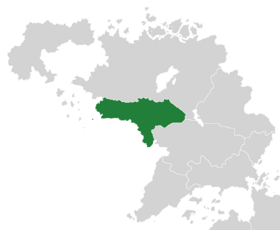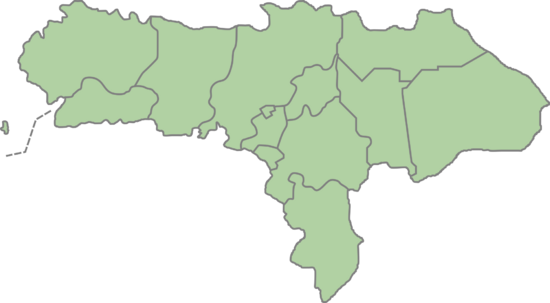Lorcania: Difference between revisions
No edit summary |
No edit summary |
||
| Line 137: | Line 137: | ||
'''Lorcania''' ({{wp|Irish language|Ghaillish}}: ''Lorcáinann''), officially the '''Union of Lorcania''' ({{wp|Irish language|Ghaillish}}: ''Aontas na Lorcáinann''), is a {{wp|federation}} of twelve states in northwestern [[Asteria Superior]], bounded by the [[Vehemens Ocean|Vehemens]] to the west and bordering [[Cassier]] to the north and [[Nuxica]] to the south. With a population of 46.5 million, Lorcania is considered a regional power. [[Calderdon]] is the capital, while [[Na Naoimh]] is the largest city. | '''Lorcania''' ({{wp|Irish language|Ghaillish}}: ''Lorcáinann''), officially the '''Union of Lorcania''' ({{wp|Irish language|Ghaillish}}: ''Aontas na Lorcáinann''), is a {{wp|federation}} of twelve states in northwestern [[Asteria Superior]], bounded by the [[Vehemens Ocean|Vehemens]] to the west and bordering [[Cassier]] to the north and [[Nuxica]] to the south. With a population of 46.5 million, Lorcania is considered a regional power. [[Calderdon]] is the capital, while [[Na Naoimh]] is the largest city. | ||
Prior to contact with [[Euclea]], the region was inhabited primarily by the {{wp|Iroquoian peoples|Hauronian}} and {{wp|Algonquian peoples|Rakensian}} peoples. After [[Assim Asteris]] opened the country up to colonisation in 1488, the kingdoms of [[Caldia]] and [[Estmere]] became the primary colonial powers in the region. Their colonies in the area would grow considerably in the following years, although in the aftermath of the [[Gilded Wars]] the entire region would be come under [[Gaullica|Gaullican]] control alongside the rest of the western seaboard. The local {{wp|Amendism|Amendist}} populations clashed with the new [[Solarian Catholic Church|Catholic]] ascendancy, which helped to fuel anti-Gaullican and {{wp|Creole nationalism|colonial nationalist}} sentiments, eventually culminating in the [[Kindalk Massacre]] in 1764 and Lorcanian involvement in the [[Asterian War | Prior to contact with [[Euclea]], the region was inhabited primarily by the {{wp|Iroquoian peoples|Hauronian}} and {{wp|Algonquian peoples|Rakensian}} peoples. After [[Assim Asteris]] opened the country up to colonisation in 1488, the kingdoms of [[Caldia]] and [[Estmere]] became the primary colonial powers in the region. Their colonies in the area would grow considerably in the following years, although in the aftermath of the [[Gilded Wars]] the entire region would be come under [[Gaullica|Gaullican]] control alongside the rest of the western seaboard. The local {{wp|Amendism|Amendist}} populations clashed with the new [[Solarian Catholic Church|Catholic]] ascendancy, which helped to fuel anti-Gaullican and {{wp|Creole nationalism|colonial nationalist}} sentiments, eventually culminating in the [[Kindalk Massacre]] in 1764 and Lorcanian involvement in the [[Asterian War of Secession|War for Independence]]. Following the victory of the United Colonies during the war, dreams of a pan-Asterian federation were dashed, and the northern and southern colonies went their separate ways. | ||
The seven states of Lorcania entered into federation in 1771, ratifying a constitution by the next year. Five additional states would be admitted to the union throughout post-independence history. From the 1800s onward, the Union would engage in the Eastward Drive, in which it attempted to expand through the interior of the Asterian continent in order to obtain an eastern port. These ambitions would culminate in the [[Interior Wars]] with the other Asterian powers, and ultimately the Union would be unsuccessful in gaining a foothold in the east. Following increasing societal pressures and a powerful {{wp|Georgism|single-tax}} movement, Lorcania would experience societal upheaval throughout the 1910s, culminating in the [[Great Reforms]] of 1927, which would extend voting privileges to all and introduce a land tax across the Union. During the [[Great War (Kylaris)|Great War]], Lorcania engaged in armed neutrality, before eventually joining the Grand Alliance. In the post-war era, the Union engaged in a brief stand-off with syndicalist [[Chervolesia]], before embracing a broader foreign policy. | The seven states of Lorcania entered into federation in 1771, ratifying a constitution by the next year. Five additional states would be admitted to the union throughout post-independence history. From the 1800s onward, the Union would engage in the Eastward Drive, in which it attempted to expand through the interior of the Asterian continent in order to obtain an eastern port. These ambitions would culminate in the [[Interior Wars]] with the other Asterian powers, and ultimately the Union would be unsuccessful in gaining a foothold in the east. Following increasing societal pressures and a powerful {{wp|Georgism|single-tax}} movement, Lorcania would experience societal upheaval throughout the 1910s, culminating in the [[Great Reforms]] of 1927, which would extend voting privileges to all and introduce a land tax across the Union. During the [[Great War (Kylaris)|Great War]], Lorcania engaged in armed neutrality, before eventually joining the Grand Alliance. In the post-war era, the Union engaged in a brief stand-off with syndicalist [[Chervolesia]], before embracing a broader foreign policy. | ||
| Line 149: | Line 149: | ||
===Colonial period=== | ===Colonial period=== | ||
===Independence and federation=== | ===Independence and federation=== | ||
{{main|Asterian War | {{main|Asterian War of Secession}} | ||
===Eastward Drive=== | ===Eastward Drive=== | ||
{{main|Eastward Drive|Interior Wars}} | {{main|Eastward Drive|Interior Wars}} | ||
Revision as of 12:07, 20 July 2019
Union of Lorcania Aontas na Lorcáinann | |
|---|---|
| Motto: "Unitatem et Liberum" "In Unity and Freedom" | |
| Anthem: Glory to the Union | |
 Location of the Union of Lorcania (green) in Asteria Superior (grey). | |
| Capital | Calderdon |
| Largest | Na Naoimh |
| Official languages | |
| Recognised regional languages | |
| Demonym(s) | Lorcanian |
| Government | Federal presidential constitutional republic |
| Cormac Ó Néill | |
| Liam Richmond | |
• Speaker | Corey Campbell |
| Samhaoir Nic Thóm | |
| Legislature | Parliament |
| House of Notables | |
| House of Commons | |
| Independence from the Gaullican Empire | |
• Declaration | 11 August 1766 |
• Federation | 22 December 1771 |
• Constitution | 6 January 1778 |
• Amendment | 17 July 1802 |
• Great Reforms | 30 June 1927 |
| Area | |
• Total | 1,740,856 km2 (672,148 sq mi) |
• Water (%) | 0.9 |
| Population | |
• 2019 estimate | 48,129,000 |
• 2016 census | 46,571,281 |
• Density | 26.75/km2 (69.3/sq mi) |
| GDP (PPP) | 2016 estimate |
• Total | $2.115 trillion |
• Per capita | $45,408 |
| GDP (nominal) | 2016 estimate |
• Total | $1.876 trillion |
• Per capita | $40,293 |
| Currency | Shilling (SSH) |
| Time zone | UTC+9 to +10 |
| Date format | mm.dd.yyyy, CE |
| Driving side | right |
| Internet TLD | .uol |
Lorcania (Ghaillish: Lorcáinann), officially the Union of Lorcania (Ghaillish: Aontas na Lorcáinann), is a federation of twelve states in northwestern Asteria Superior, bounded by the Vehemens to the west and bordering Cassier to the north and Nuxica to the south. With a population of 46.5 million, Lorcania is considered a regional power. Calderdon is the capital, while Na Naoimh is the largest city.
Prior to contact with Euclea, the region was inhabited primarily by the Hauronian and Rakensian peoples. After Assim Asteris opened the country up to colonisation in 1488, the kingdoms of Caldia and Estmere became the primary colonial powers in the region. Their colonies in the area would grow considerably in the following years, although in the aftermath of the Gilded Wars the entire region would be come under Gaullican control alongside the rest of the western seaboard. The local Amendist populations clashed with the new Catholic ascendancy, which helped to fuel anti-Gaullican and colonial nationalist sentiments, eventually culminating in the Kindalk Massacre in 1764 and Lorcanian involvement in the War for Independence. Following the victory of the United Colonies during the war, dreams of a pan-Asterian federation were dashed, and the northern and southern colonies went their separate ways.
The seven states of Lorcania entered into federation in 1771, ratifying a constitution by the next year. Five additional states would be admitted to the union throughout post-independence history. From the 1800s onward, the Union would engage in the Eastward Drive, in which it attempted to expand through the interior of the Asterian continent in order to obtain an eastern port. These ambitions would culminate in the Interior Wars with the other Asterian powers, and ultimately the Union would be unsuccessful in gaining a foothold in the east. Following increasing societal pressures and a powerful single-tax movement, Lorcania would experience societal upheaval throughout the 1910s, culminating in the Great Reforms of 1927, which would extend voting privileges to all and introduce a land tax across the Union. During the Great War, Lorcania engaged in armed neutrality, before eventually joining the Grand Alliance. In the post-war era, the Union engaged in a brief stand-off with syndicalist Chervolesia, before embracing a broader foreign policy.
Today, Lorcania is a federal presidential constitutional republic, operating a mixed economy with a GDP (PPP) per capita of $45,408. Lorcania is unique in that it maintains a land tax across all sectors. The current President is Cormac Ó Néill, while the current Vice-President is Liam Richmond. The union is a member of the Community of Nations, ICD, ITO and GIFA.
Etymology
History
Prior to Euclean contact
Colonial period
Independence and federation
Eastward Drive
Upheaval and the Great Reforms
Great War
Post-war era
Geography
Environment
Flora and fauna
Politics

|

|

|
| Cormac Ó Néill President since 2015 |
Liam Richmond Vice-President since 2015 |
Corey Campbell Speaker since 2015 |
Government
Federal subjects
Lorcania is a federation, comprised of twelve constituent states. These states are also grouped together into three cultural heritage regions, based on the linguistic character of the states. There is the Ghaillophone Sheah (Ghaillish: Sídhe), the Estmerophone New Estmere (Ghaillish: Astaena Nua) and the allophone Eastern Territory (Ghaillish: Críoch an Oirthir).
| Region (Réigiún) |
State (Stát) |
Capital | Population | Governor (Gobharnóir) |
Governing party | Location | ||
| New Estmere | Alwoodley | 10,393,427 | Natalie Palmer | Whigs | ||||
| Newcastle | 4,529,698 | Irvin Reed | DSC | |||||
| Dorchester | 3,924,271 | S.C. Louis | Nationals | |||||
| Harbington | 1,654,563 | Andrew Murray | Whigs | |||||
| Sheah | Manning | 2,029,698 | Lachtín Ó Sluagháin | Whigs | ||||
| Ballincor | 1,360,394 | Glassán Ó Breislin | Nationals | |||||
| Kilnagross | 6,943,116 | Sinéad Mhic Céin | Whigs | |||||
| Teampaill | 256,398 | Nuala Uí Máille | Nationals | |||||
| Na Naoimh | 8,033,694 | Téide Ní Síthigh | DSC | |||||
| Eastern Territory | Sheldon | 3,127,893 | Morgan Hughes | Whigs | ||||
| Fort Dowell | 1,928,345 | Bill Wohali | Indigenous | |||||
| Morley | 1,762,394 | Travone Jackson | Nationals | |||||
Foreign relations and military
Economy
Agriculture
Tourism
Transport
Energy
Science and technology
Demographics
Language
Religion
Ethnic groups
Education
Health
Culture
Art
Music
Cinema
Literature
Philosophy
Society
Architecture
National symbols
Fashion and design
Cuisine
Sport
Public holidays



